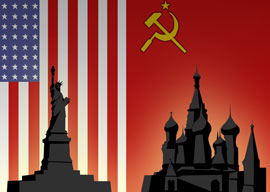
March 26, 2014

In the desperate days of early 1951, Washington seriously discussed the use of nuclear weapons. Eventually, the new American battlefield commander Matthew Ridgway, one of the few figures to emerge from the Korean conflict with his reputation enhanced, stabilized the situation. Using the American advantage in artillery to kill vast numbers of brave but outgunned Chinese communists, Ridgway fought back to the pre-war border at the 38th parallel, where the agony finally halted in 1953.
The continued existence of the North Korean communist buffer state between the American-led alliance and China is a horrible burden on the poor and ever-shorter subjects of that regime. If MacArthur had succeeded in conquering North Korea in 1950, the North Koreans would presumably now be as prosperous as their Hyundai-building and break dancing cousins in South Koreans.
On the other hand, the malignant North Korean state continues to serve its purpose: China and America at present do not get into desperate land wars in Asia like they did in 1950.
Buffer states are usually not ideal for their citizens. For example, Belgium exists today less because the Walloons and Flemish enjoy each other’s company (they don’t), but because Belgium serves the purposes of the great powers of Western Europe, especially Britain, which entered the Great War in August 1914 to avenge Germany’s violation of Belgian neutrality as it invaded France. The English have sensibly preferred to fight their battles in the Low Countries rather than on their own territory.
In Russian geopolitical thinking, Ukraine and Belarus similarly serve as its buffer states. Just as dominant Germany now enjoys a sizable buffer of NATO allies and EU members to its east, Russia has wanted a couple of scraps of its old empire to remain out of the Western alliance. The Russians believe that enjoying the luxury of buffer states is the mark of a Great Power. (American policy since the 1823 Monroe Doctrine has been to possess a buffer hemisphere.) Thus, Moscow looked askance upon the violent overthrow of an elected friend in Kiev.
On the other hand, Russia’s Crimea response violates a general principle of modern international order that one country can’t legally annex a chunk of another country by a localized secession referendum imposed by military might. (The US would object to Canadian troops carrying out a secession vote in Seattle. On the other hand, if Ontario wants to try that in Detroit….) Like NATO’s Kosovo adventure before it, Crimea sets a bad precedent. So the US ought to withhold recognition of Russia’s takeover of the Crimea.
Obviously, the Russians are emotional about their historic naval port of Sevastopol and thus won’t give up Crimea. Fortunately, a potential way out of the current impasse might be to induce Russia to sit down with Ukraine and negotiate a fair, mutually agreed upon price for the peninsula in return for international recognition of Russian possession.
You’ll recall that at the end of the Mexican-American War (1848) and the Spanish-American War (1898), the US retroactively semi-legitimized its takings by paying Mexico $15 million and Spain $20 million. Granted, the US paid Spain roughly ten cents on the dollar for the Philippines, but the right of conquest was then only starting to go out of fashion. (The Kellogg-Briand Pact of 1928 marks perhaps the first formal step toward proscription.)
Since Russia didn’t particularly seize Crimea out of calculated economic self-interest, but more out of feelings (not wholly unreasonable) of wounded national amour-propre, deft diplomacy might actually succeed in inducing the Russians to offer an agreeably large price to Ukraine in the spirit of, say, a magnanimous gesture on the part of a great nation toward their brother Slavs. This would preserve the global expectation that you can’t go around taking chunks of other countries without paying for their permission.
Would this work? Probably not, but Russia might eventually realize that it needs to deprive Beijing of an excuse for someday taking back parts of Siberia once claimed by the Emperor of China.
On the other hand, this sort of reasonable resolution of a foreboding situation would be bad for the American promoters of World War G, so it’s not likely to become American policy.